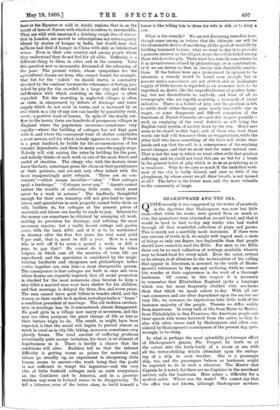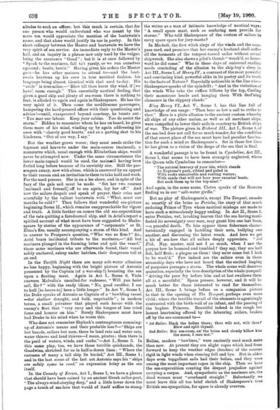SHAKESPEARE AND THE SEA.
QUITE recently it was suggested by the writer of an article in the Spectator that Shakespeare was now but little read,—that while his works were quoted from as much as ever, the quotations were obtained at second hand, and that it would be hard to find to-day any reader who had waded through all that wonderful collection of plays and poems. This is surely not a carefully made statement. If there were any amount of truth in it, we might well regard such a state of things as only one degree less deplorable than that people should have ceased to read the Bible. For next to the Bible there can be no such collection of writings available wherein may be found food for every mind. Even the sailor, critical as he always is of allusions to the technicalities of his calling that appear in literature, is arrested by the truth of Shake- speare's references to the sea and seafaring, while he cannot but wonder at their copiousness in the work of a thorough landsman Of course, in this respect it is necessary to remember that Elizabethan England spoke a language which was far more frequently studded with sea-terms than that which we speak ashore to-day. With all our vast commerce and our utter dependence upon the sea for our very life; its romance, its expressions take little hold of the immense majority of the people. Therein we differ widely from Americans. In every walk of life, from Maine to Mexico, from Philadelphia to San Francisco, the American people salt their speech with terms borrowed from the sailor, as they do also with other terms used by Shakespeare, and often con- sidered by Shakespeare's countrymen of the present day, quitt wrongly, to be slang.
In what is perhaps the most splendidly picturesque effort of Shakespeare's genius, The Tempest, he hurls Us at the outset into the hurly-burly of a storm at sea with all the terror-striking details attendant upon the embay- ing of a ship in such weather. She is a passenger ship, too, and the passengers behave as landsmen might be expected to do in such a situation. The Master (not Captain be it noted, for there are no Captains in the merchant service) calls the boatswain. Here arises a difficulty for a modern sailor. Where was the mate ? We cannot say that the office was not known, although Shakespeare nowhere
alludes to such an officer, but this much is certain, that for one person who would understand who was meant by the mate ten would appreciate the mention of the boatswain's name, and that alone would justify its use in poetry. In this short colloquy between the Master and boatswain we have the very spirit of sea service. An immediate reply to the Master's hail, and an inquiry in a phrase now only used by the vulgar, bring the assurance " Good " ; but it is at once followed by "Speak to the mariners, fall to't yarely, or we run ourselves aground ; bestir, bestir." Having given his orders the Master goes—he has other matters to attend to—and the boat- swain heartens up his crew in true nautical fashion, his language being almost identical with that used to-day. His "aside" is true sailor,—" Blow till thou burst thy wind, if [we havel room enough." This essentially nautical feeling, that given a good ship and plenty of sea-room there is nothing to fear, is alluded to again and again in Shakespeare. He has the very spirit of it. Then come the meddlesome passengers, hampering the bard-pressed officer with their questioning and advice !—until, exasperated beyond courtesy, he bursts out : "You mar our labour. Keep your cabins. You do assist the storm." Bidden to remember whom he has on board, he gives them more of his mind, winding up by again addressing his crew with " cheerly good hearts," and as a parting shot to his hinderers, "Out of our way, I say."
But the weather grows worse; they must needs strike the topmast and heave-to under the main-course (mainsail), a manceuvre which, usual enough with Elizabethan ships, would never be attempted now. Under the same circumstances the lower main-topsail would be used, the mainsail having been furled long before because of its unwieldy size. Still the pas- sengers annoy, now with abuse, which is answered by an appeal to their reason and an invitation to them to take hold and work. For the need presses. She is on a lee shore, and in spite of the fury of the gale sail must be made. "Set her two courses trenirmail and foresail] off to sea again, lay her off:' And now the sailors despair and speak of prayer, their cries met scornfully by the valiant boatswain with "What, must our mouths be cold ? " Then follows that wonderful sea-picture beginning Scene II., which remains unapproachable for vigour and truth. A little farther on comes the old sea-superstition of the rats quitting a foredoomed ship, and in Ariel's report a spirited account of what must have been suggested to Shake- speare by stories of the appearance of " corposants " or St. Elmo's fire, usually accompanying a storm of this kind. And in answer to Prospero's question, "Who was so firm ? "
Ariel bears incidental tribute to the mariners,—" All but mariners plunged in the foaming brine and quit the vessel," those same mariners who are afterwards found, their vessel safely anchored, asleep under hatches, their dangerous toil at an end.
In the Twelfth .Night there are many salt-water allusions no less happy, beginning with the bright picture of Antonio presented by the Captain (of a war-ship ?) breasting the sea upon a floating mast. Again in Act I., Scene 6, Viola answers Malvolio's uncalled-for rudeness, "Will you hoist sail, Sir ? " with the ready idiom, "No, good swabber, I am to hull [to heave-to] here a little longer." In Act V., Scene 1, the Duke speaks of Antonio as Captain of a " bawbling vessel —for shallow draught, and bulk, nnprizable " ; in modern terms, a small privateer that played such havoc with the enemy's fleet that "very envy and the tongue of loss cried fame and honour on him." Surely Shakespeare must have had Drake in his mind when he wrote this.
Who does not remember Shylock's contemptuous summing- up of Antonio's means and their probable loss ?—" Ships are but boards, sailors but men, there be land rats and water rats, water thieves and land thieves—I mean, pirates; then there is the peril of waters, winds, and rocks."—Act I., Scene 3. In this same play, too, we have those terrible quicksands, the Goodwin, sketched for us in half-a-dozen lines : "Where the carcases of many a tall ship lie buried," Act III., Scene 1; and in the last scene of the last act Antonio says his "ships are safely come to road," an expression briny as the sea itself.
In the Comedy of Errors, Act I., Scene 1, we have a phrase that should have been coined by an ancient Greek sailor-poet, 'The always-wind-obeying deep," and a little lower down the page a touch of sea-lore that would of itself suffice to stamp the writer as a man of intimate knowledge of nautical ways A small spare mast, such as seafaring men provide for storms." Who told Shakespeare of the custom of sailors to carry spare spars for jury-masts?
In Macbeth, the first witch sings of the winds and the corn. pass card, and promises that her enemy's husband shall suffer all the torments of the tempest-tossed sailor without actual shipwreck. She also shows a pilot's thumb " wrack'd, as home- ward he did come." Who in these days of universal reading needs reminding of the allusion to the ship-boy's sleep in Act DI, Scene 1, of Henry IV., a contrast of the most powerful and convincing kind, powerful alike in its poetry and its truth to the facts of Nature? Especially noticeable is the line where Shakespeare speaks of the spindrift: "And in the visitation of the winds Who take the ruffian billows by the top, Curling their monstrous heads and hanging them With dearning clamours in the slippery clouds."
Sing Henry VI., Act V., Scene 1, has this line full of knowledge of sea usage : "Than bear so low a sail to strike to thee." Here is a plain allusion to the ancient custom whereby all ships of any other nation, as well as all merchant ships, were compelled to lower their sails in courtesy to British ships of war. The picture given in Richard III., Act I., Scene 4, of the sea-bed does not call for so much wonder, for the condition of that secret place of the sea must have had peculiar fascita- tion for such a mind as Shakespeare's. Set in those few lines he has given us a vision of the deeps of the sea that is final.
A wonderful passage is to be found in Cymbeline, Act Scene 1, that seems to have been strangely neglected, where the Queen tells Cymbeline to remember—
"The natural bravery of your isle, which stands As Neptune's park, ribbed and paled in With rocks tinscaleable and roaring waters; With sands that will not bear your enemies' boats, But suck them up to the top-mast."
And again, in the same scene, Cloten speaks of the Romans finding us in our "salt-water girdle."
But no play of Shakespeare's, except The Tempest, smacks so smartly of the brine as Pericles, the story of that much enduring Prince of Tyre whose nautical mishaps are made to have such a miraculously happy ending. In Act IL, Scene 1, enter Pericles, wet, invoking heaven that the sea having mani- fested its sovereignty over man, may grant him one last boon, —a peaceful death. To him appear three fishermen charac- teristically engaged in handling their nets, bullying one another, and discussing the latest wreck. And here we get a bit of sea-lore that all sailors deeply appreciate. "rd Fish. Nay, master, said not I as much, when I saw the porpus how he bounced and tumbled ? they say, they are half fish, half flesh; a plague on them ! they ne'er come but I look to be wash'd." Few indeed are the sailors even in these steamship days who have not heard that the excited leaping of porpoises presages a storm. The whole scene well deserves quotation, especially the true description of the whale (rorqual) "driving the poor fry before him and at last swallows them all at a mouthful." Space presses, however, and it will be much better for those interested to read for themselves.
Act 111., Scene 1, brings before us a companion picture to that in the opening of The Tempest, perhaps even more vivid ; where the terrible travail of the elements is agonisingly contrasted with the birth-wail of an infant, and the passing of the hapless Princess. Beautiful indeed is the rough but honest heartening offered by the labouring sailors, broken off by the sea-command to- " let Sailor. Slack the bolins there; thou wilt not, wilt thou? Blow and split thyself.
2nd Sailor. But sea-room, an' the brine and cloudy billow kiss the moon, I care not."
Bolins, modern "bowlines," were anciently used much more than now. At present they are slight ropes which lead from forward to keep the weather edges (leaches) of the courses rigid in light winds when steering full and bye. But in olden days even topgallant sails had their bolins, and they were among the most important ropes in the ship. Then we have the sea-superstition creating the deepest prejudice against carrying a corpse. And, sympathetic as the mariners are, the dead woman must "overboard straight." Reluctantly we must leave this all too brief sketch of Shakespeare's true British sea-sympathies, for space is already overrun.







































 Previous page
Previous page